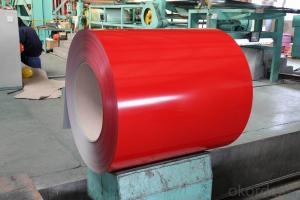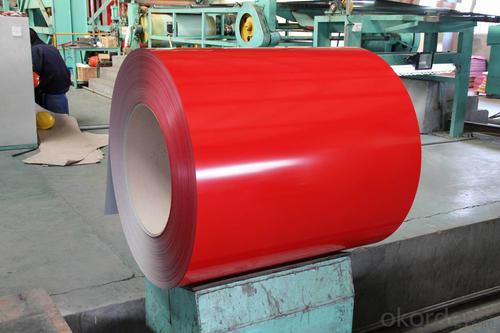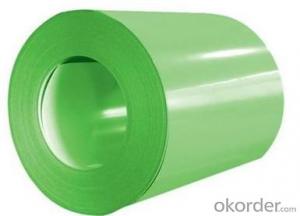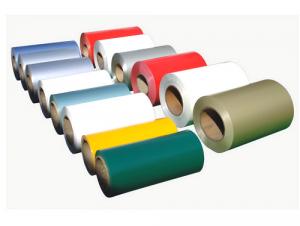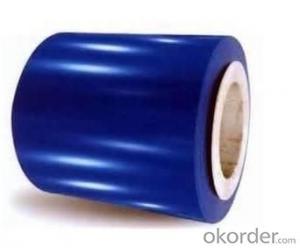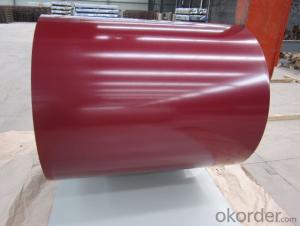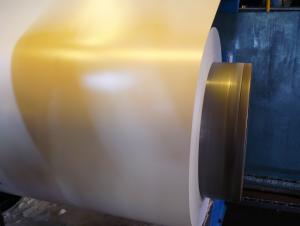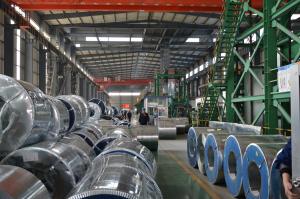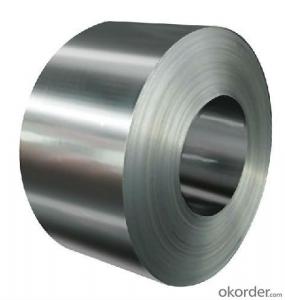Prepainted Galvanized Steel Coils--Workability, Durability
- Loading Port:
- China main port
- Payment Terms:
- TT OR LC
- Min Order Qty:
- 25 m.t.
- Supply Capability:
- 10000 m.t./month
OKorder Service Pledge
OKorder Financial Service
You Might Also Like
Prepainted Galvanized Steel Coils--Workability Durability
Description of Prepainted Galvanized Steel Coils
Prepainted Galvanized Steel usually refers to have substrate processed with surface processed and coated then(roller coated )or bonded organic thin film and baked, and it is able to be processed to final prodevtion .
Prepainted Galvanized Steel qualified with excellent decorative ,formability ,corrosion resistance ,coating adhesion ,can keep for a long time as well as maintain fresh color .For color coated steel sheet can obtain good economic benefit by steel belt wood ,efficient in construction and save energy ,prevent pollution etc.Which is an ideal material;for manufacturing board.
Specification:
Thickness: 0.2-0.8mm
Width: 600-1250mm
Length: on request
Zinc coating: 30-275g/m2
Color: RAL series
Images
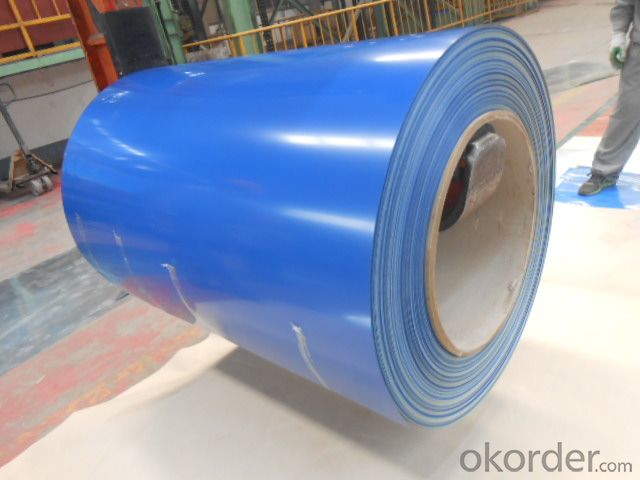
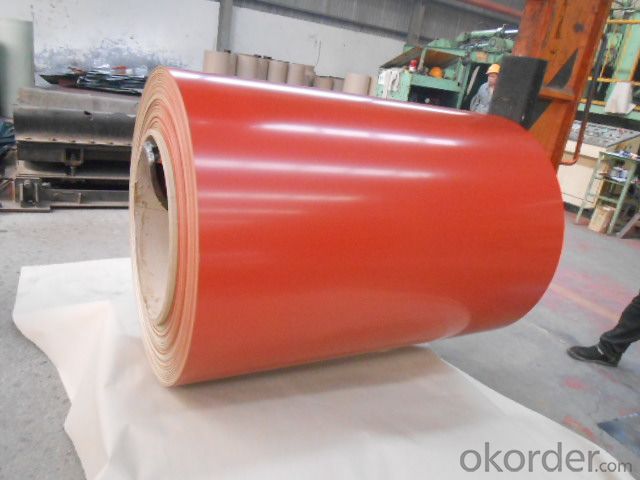
Application:
1.Buildings and constructions: roofing, ceilings, gutters, venting lines, indoor decorations,window frames, etc
2.Electrical appliances: computer shells, washing machines, refrigerators, dehumidifiers,video recorders, water heaters, etc.
3. Agricultural equipments: troughs, feeding tools, agricultural driers, irrigation channels, etc.
Main Features:
1. High strength
2. Well rainproof performance
3. Good corrosion
4. Easy to install and remove
FAQ
1.How to guarantee the quality of the products?
We have established the international advanced quality management system,every link from raw material to final product we have strict quality test;We resolutely put an end to unqualified products flowing into the market.
2. How long can we receive the product after purchase?
Usually within thirty working days after receiving buyer’s advance payment or LC. We will arrange the factory manufacturing as soon as possible. The cargo readiness usually takes 15-25 days, but the shipment will depend on the vessel situation.
- Q: I am a beginner (never played before!) and I am going to try to teach myself since I think it is a lovely instrument. I am fourteen-years-old so I am not 'adult-size', haha. Anyway, what is difference between nylon strings and steel strings?Thanks :)
- Small guitars easier to find in classical range. I assume their must be small steel strings but not seen them.
- Q: Steel used to be made in the #92;Bessemer Converter, write about how steel making processes today produce better quality steel????
- how we can prepared steel by using converter? ans it
- Q: How are steel coils used in the production of steel hooks?
- Steel coils are used in the production of steel hooks by being shaped and cut into the desired hook shape. The coils are uncoiled and fed into a machine where they undergo various processes such as bending, shaping, and welding to form the hooks. The strength and durability of the steel coils contribute to the quality and reliability of the final steel hooks.
- Q: How are steel coils used in the production of automobile frames?
- Steel coils are used in the production of automobile frames as they are unrolled and shaped into the desired form to create the structural framework that provides strength and rigidity to the vehicle.
- Q: How are steel coils labeled and identified?
- Steel coils are labeled and identified through a variety of methods to ensure proper tracking and handling throughout their journey. The labeling and identification process typically involves the following steps: 1. Manufacturer's Identification: The steel coil is initially marked with the manufacturer's name or logo, allowing for easy identification of the company that produced it. 2. Coil Number: Each steel coil is assigned a unique identification number, commonly referred to as a coil number. This number is often stamped or etched onto the surface of the coil and is used for tracking and inventory purposes. 3. Size and Weight: Steel coils are labeled with their size and weight specifications. This information helps in determining the dimensions and weight capacity of the coil, allowing for appropriate handling and transportation arrangements. 4. Grade and Material: The grade and material composition of the steel coil are typically indicated on the labeling. This provides essential information about the properties and quality of the steel, ensuring it is utilized correctly in manufacturing processes. 5. Heat or Lot Number: Steel coils can also be labeled with a heat or lot number, which refers to the production batch from which the coil originated. This information helps in traceability and quality control, facilitating identification in case of any issues or defects. 6. Barcodes or QR codes: Many steel coils are now labeled with barcodes or QR codes, which can be scanned using automated systems. These codes contain all relevant information about the coil, allowing for efficient data capture and management throughout the supply chain. Proper labeling and identification of steel coils are crucial for effective logistics management, inventory control, and quality assurance. By employing these identification methods, manufacturers, distributors, and end-users can easily track, handle, and utilize steel coils in a safe and efficient manner.
- Q: How are steel coils used in the production of electrical devices?
- Steel coils are an essential component in the production of electrical devices. These coils are typically made from high-quality steel that is precisely wound into a circular shape. They play a crucial role in the functioning of various electrical devices, such as transformers, motors, generators, and inductors. One primary use of steel coils is in transformers. Transformers are vital for stepping up or stepping down voltage levels in electrical circuits. They consist of two separate coils, known as the primary and secondary coils, which are wound around a magnetic core. The steel coil provides stability and support to the windings, ensuring proper alignment and preventing any deformation. Additionally, the high magnetic permeability of steel helps to enhance the efficiency of energy transfer between the coils. In motors and generators, steel coils are employed to create magnetic fields that generate mechanical energy or convert it into electrical energy. The coils are wound around an armature or rotor, which rotates within a magnetic field created by a stator. As the current flows through the coils, a magnetic field is produced, resulting in the rotation of the armature or the generation of electrical power. Inductors, another type of electrical device, also utilize steel coils. An inductor is essentially a coil of wire wound around a core material, often made of steel. Steel coils in inductors help to increase the inductance, which is a measure of the device's ability to store energy in a magnetic field. By storing energy in this manner, inductors can regulate currents, filter out noise, and provide stability to electrical circuits. Overall, steel coils play a vital role in the production of electrical devices by providing stability, support, and enhancing the magnetic properties necessary for their efficient functioning. Without steel coils, the performance and reliability of electrical devices, such as transformers, motors, generators, and inductors, would be significantly compromised.
- Q: What are the different methods of coil joining for steel coils?
- There exists a variety of techniques for joining steel coils, each with its own advantages and limitations. Some commonly employed methods encompass the following: 1. Welding: Among the most popular methods of coil joining, welding involves the use of heat to melt and fuse the edges of steel coils. Arc welding, resistance welding, or laser welding can be utilized for this purpose. Welding offers a robust and durable joint, although it can be time-consuming and necessitate skilled operators. 2. Mechanical fastening: This technique entails the use of mechanical fasteners like clips, staples, or bolts to connect the edges of steel coils. Mechanical fastening is relatively quick and straightforward, and it allows for easy disassembly if needed. However, the joint may not be as strong as welding and can be prone to loosening over time. 3. Adhesive bonding: Adhesive bonding involves the use of a suitable adhesive or glue to bond the edges of steel coils. This approach yields a strong and uniform joint, while also providing protection against corrosion. However, adhesive bonding may require surface preparation and curing time, and it might not be suitable for high-temperature applications. 4. Interlocking or tongue-and-groove joints: This method involves shaping the edges of steel coils in a manner that they interlock or fit together like puzzle pieces. Interlocking joints provide good alignment and are easily assembled and disassembled. Nevertheless, they may not yield as strong a joint as welding or mechanical fastening. 5. Coil-overlapping: In this method, the edges of steel coils are overlapped and clamped together using mechanical means. Coil-overlapping is a simple and cost-effective technique, albeit it may not yield a strong joint and can result in uneven coil edges. When selecting the appropriate method of coil joining for steel coils, it is crucial to consider factors such as application requirements, strength requirements, cost, and production efficiency.
- Q: How are steel coils distributed globally?
- Steel coils are distributed globally through various means such as shipping, rail, and truck transportation. They are typically transported in bulk quantities to steel processing plants, construction sites, and manufacturing facilities worldwide. Distribution channels and logistics networks play a crucial role in ensuring efficient and timely delivery of steel coils to meet the demands of different industries and markets across the globe.
- Q: How are steel coils used in the production of storage tanks and silos?
- Steel coils are an essential component in the production of storage tanks and silos due to their strength and durability. These coils are typically made from high-quality steel and are processed through various manufacturing techniques to attain the desired thickness and shape. In the production process, steel coils are first uncoiled and then cut into specific sizes and lengths to meet the requirements of the storage tank or silo design. The coils are then shaped into cylindrical sections, using bending and rolling machines, to create the main body of the tank or silo. Once the desired shape is achieved, the coils are welded together to form a continuous and secure seam. This welding process ensures that the tanks and silos are leak-proof and can withstand the pressure exerted by the stored materials. Furthermore, steel coils also play a crucial role in reinforcing the structure of storage tanks and silos. They are often used to create the roofs, bottoms, and other structural components of these storage units. The strength and resilience of steel make it ideal for withstanding the weight of the stored materials and any external forces that may be exerted on the tank or silo. Additionally, steel coils can be coated or treated with protective materials to enhance their resistance to corrosion and extend their lifespan. This is particularly important for storage tanks and silos that are used to store corrosive substances or are exposed to harsh environmental conditions. Overall, steel coils are a fundamental element in the production of storage tanks and silos, providing the necessary strength, durability, and structural integrity required for these storage units.
- Q: Are Steel buildings Fire Resistant, just want to know as I am going to owe it . Suggestions required…………..
- What burns in a building are mostly the furnishings and interior, not the frame it's made of. Steel buildings are more expensive to insure against fire than wood frame buildings, because in a fire more steel is damaged by warping and distortion than would happen in a wood-framed structure, and wood structures are easier (and cheaper) to repair. Of course, if everything in a building was non-flammable, fire would never occur. That doesn't usually happen, though, and it's all the flammable stuff that most buildings house inside that burns.
Send your message to us
Prepainted Galvanized Steel Coils--Workability, Durability
- Loading Port:
- China main port
- Payment Terms:
- TT OR LC
- Min Order Qty:
- 25 m.t.
- Supply Capability:
- 10000 m.t./month
OKorder Service Pledge
OKorder Financial Service
Similar products
Hot products
Hot Searches
Related keywords
